|
|
|
Sort Order |
|
|
|
Items / Page
|
|
|
|
|
|
|
| Srl | Item |
| 1 |
ID:
155166
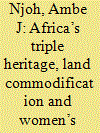

|
|
|
|
|
| Summary/Abstract |
Women have less access to land than men in Africa. Previous analyses have typically identified African indigenous culture as the problem’s exclusive source. With Cameroon, Kenya and Sierra Leone as empirical referents, an alternative explanation is advanced. Here, the problem is characterized as a product of Africa’s triple heritage, comprising three main cultures, viz., African indigenous tradition, European/Christianity and Arabia/Islam. The following is noted as a major impediment to women’s access to, and control of, land: the supplanting of previously collective land tenure systems based on family or clan membership by ‘ability-to-pay’ as the principal determinant of access to land.
|
|
|
|
|
|
|
|
|
|
|
|
|
|
|
|
| 2 |
ID:
062032
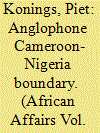

|
|
|
| 3 |
ID:
189357
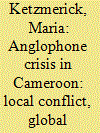

|
|
|
|
|
| Summary/Abstract |
After years of peaceful demonstrations, the Cameroonian Anglophone conflict escalated in 2017. Since the outbreak, over 3,000 people have died and a further thousand Anglophones fled from clashes between state forces and separatist fighters. While activists in the diaspora bid for international support, organizational belonging on the ground changes quickly. The paper investigates the transnationalization of the conflict by looking at the complex set of actors involved. Overall, it is interested in the political sociology of transnational rebel governance. The paper highlights the effects of transnational conflict dynamics on the unity and fragmentation of the self-determination movement and its relation to violence.
|
|
|
|
|
|
|
|
|
|
|
|
|
|
|
|
| 4 |
ID:
186748
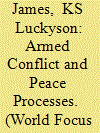

|
|
|
|
|
| Summary/Abstract |
The African continent is a politically unstable, and volatile regions in the world. For instance, in Cameroon, the national dialogue is the only way forward to empower all sections of society to resolve the crisis. Ethiopia has a multi-ethnic and cultural diversity adopted the system of ethnic federalism. The political instability was due to the demand of the Tigray ethnic group to restore its dominant position. The peace process for ending the civil war is still a difficult task as the demand for regional autonomy of Tigray has intensified.
|
|
|
|
|
|
|
|
|
|
|
|
|
|
|
|
| 5 |
ID:
075091


|
|
|
|
|
| Publication |
Leiden, African Studies Centre, 2005.
|
| Description |
xv, 408p.
|
| Series |
African Studies Centre Research Report 77/2005
|
| Standard Number |
9054480160
|
|
|
|
|
|
|
|
|
|
|
|
Copies: C:1/I:0,R:0,Q:0
Circulation
| Accession# | Call# | Current Location | Status | Policy | Location |
| 051941 | 303.60967/NOO 051941 | Main | On Shelf | General | |
|
|
|
|
| 6 |
ID:
169048
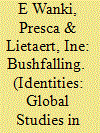

|
|
|
|
|
| Summary/Abstract |
Educational mobility in Cameroon is not a recent phenomenon, yet through the notion of ‘bushfalling’ – that is, the way international migration is envisioned and constructed in Cameroon – young Cameroonians explore routes to new destination countries for educational migration as a way of fulfilling their dreams of a better future. These dreams are enabled and challenged by the different role identities the students have to combine in the destination country. This article focuses on self-sponsored Anglophone Cameroonian students in Flanders, who combine roles as students, workers and transnational caregivers. Using bushfalling as our analytical lens, we explore the change in understanding bushfalling through the educational route and its implications for transnational family relations. Further, we explore the various ways in which these students negotiate and manipulate the different roles, yet keep the student role identity in the centre, and how this in turn informs their next step in the education-migration trajectory.
|
|
|
|
|
|
|
|
|
|
|
|
|
|
|
|
| 7 |
ID:
120902
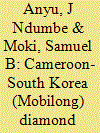

|
|
|
|
|
| Publication |
2013.
|
| Summary/Abstract |
In 2007, a South Korean geologist discovered large deposits of diamonds in Cameroon. To Cameroon, this discovery is particularly significant because it has the potential to engineer sustainable development. Cameroon suffers from acute levels of poverty, high unemployment, devastating levels of corruption, and bad governance. The spoils of diamonds could provide an undeniable avenue to engender sustainable development. However, if history is a guide, the examples of Angola, Sierra Leone, and Democratic Republic of Congo offer instructive lessons of destructive effects of diamond exploration in countries that are contemptuous of good governance and are experiencing lawlessness, economic deprivation, social unrest, and political instability. This essay provides a timely reminder to Cameroon on the consequences of mismanaged natural resources. It explores Cameroon's socioeconomic condition, examines the history of diamond exploration and mining in Cameroon, and analyzes the implications for sustainable development.
|
|
|
|
|
|
|
|
|
|
|
|
|
|
|
|
| 8 |
ID:
113468
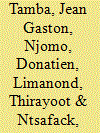

|
|
|
|
|
| Publication |
2012.
|
| Summary/Abstract |
This study examines the causal relationship between diesel consumption and economic growth in Cameroon by using a three-step modern time-series technique. Tests for unit roots, cointegration, and Granger-causality based on error correction model are employed on annual data covering the period 1975-2008. Empirical results of the study confirm the presence of a long-run equilibrium relationship between diesel consumption and economic growth. The error correction model shows that an estimated 1% increase in economic growth causes a rise in diesel consumption of 1.30% in the long-run. The overall results show that there exists bidirectional causality in the long-run relationship and no causality in the short-run relationship between diesel consumption and economic growth at the 5% level of significance. Thus, the energy policies in Cameroon should place priority on the discovery of new oil field and building capacity additions of the refinery to increase production of petroleum products, as this would propel the economic growth of the country.
|
|
|
|
|
|
|
|
|
|
|
|
|
|
|
|
| 9 |
ID:
110589
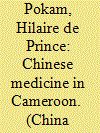

|
|
|
|
|
| Publication |
2011.
|
| Summary/Abstract |
China's arrival on the African economic scene is overturning the balance of forces in place since the independence of African countries. Africa is regarded by some as a "new hunting ground" or "promised land" for China, making it part of its global strategy. This article sets out to examine one of China's so-called "soft power" strategies, represented by the widespread practice of Traditional Chinese Medicine overseas. It focuses on Cameroon, which is a mainstay for Central Africa on account of its harbour and its regional economic dominance.
|
|
|
|
|
|
|
|
|
|
|
|
|
|
|
|
| 10 |
ID:
145995
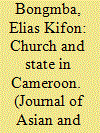

|
|
|
|
|
| Summary/Abstract |
In this essay, I discuss church state relations in Cameroon through a hermeneutics of the political theology of Christian Cardinal Tumi. I begin with a brief introduction to set the scene and follow it with a discussion of two major works by Cardinal Tumi. In the first book Tumi provides a detailed analysis of his relationship with the political leaders of Cameroon, and in the second book, he articulates his political theology. I conclude by arguing that one way forward for a political theology in Cameroon is to embrace a broad perspective that is not restricted to one’s personal faith in Jesus Christ.
|
|
|
|
|
|
|
|
|
|
|
|
|
|
|
|
| 11 |
ID:
180259


|
|
|
|
|
| Summary/Abstract |
Despite the proliferation of literature on large-scale land acquisitions (LSLA) in Africa, few empirical studies exist on how patronage networks combine with socio-cultural stratification to determine the livelihood outcomes for African agrarian-based communities. This article draws from ethnographic research on Cameroon to contribute to bridging this gap. We argue that lineage and patronage considerations intersect to determine beneficiaries and losers during LSLA. Second, we show that LSLA tend to re-entrench existing inequalities in power relations that exist within communities in favour of people with traceable ancestral lineage. Concomitantly, non-indigenous groups especially migrants, bear the brunt of exclusion and are unfortunately exposed to severe livelihood stresses due to their inability to leverage patronage networks and political power to defend their interests. We submit that empirical examination of the impacts of land acquisitions should consider the centrality of power and patronage networks between indigenes and non-indigenes, and how this socio-cultural dichotomy restricts and/or mediates land acquisition outcomes in Cameroon.
|
|
|
|
|
|
|
|
|
|
|
|
|
|
|
|
| 12 |
ID:
185366
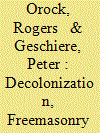

|
|
|
|
|
| Summary/Abstract |
Relating to academic debates on the emergence of moral panics over homosexuality in several parts of Africa, this article examines rumours on homosexuality as a political issue that connects colonial pasts and postcolonial struggles in Cameroon. We link current struggles over homosexuality to broader debates about the question of Cameroon’s decolonization from France. The article focuses on the figure of Dr Louis Paul Aujoulat, a French colonial official in Cameroon who played a crucial role in the country’s decolonization in the 1950s. Aujoulat died in 1972, but recently, he made a ‘return’ in rumours and public debates in a new role: he is now accused of having ‘sodomized’ the emergent new elite of Cameroon, thus introducing homosexuality; moreover, he is linked to Freemasonry and occult initiation rites. Our aim was to show how a particular decolonization trajectory—very rocky in the case of Cameroon—is related to the present-day moral panic about a supposed proliferation of homosexuality. Freemasonry and its special history on the African continent—notably its role in maintaining the coherence of Françafrique between France and its former colonies—is a severely understudied topic. Its linkages to same-sex practices and illicit enrichment give the Cameroonian case a wider relevance. We argue that the new rumours on Dr Aujoulat define him as a key figure in linking Freemasonry, homosexuality and illicit enrichment to present-day issues of state governance, citizenship and elite misrule in Cameroon.
|
|
|
|
|
|
|
|
|
|
|
|
|
|
|
|
| 13 |
ID:
125649
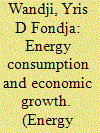

|
|
|
|
|
| Publication |
2013.
|
| Summary/Abstract |
The aim of this paper is to study the nature of the relationship between energy consumption and economic growth in Cameroon through a three-step approach: (i) Study the stationarity of the chronic, (ii) test of causality between variables and (iii) estimate the appropriate model. The study concludes in a non-stationarity of the series. Using the data in first difference, the Granger causality test yields a strong evidence for unidirectional causality running from OIL to GDP. Cointegration tests also show that these two series are co-integrated and the Error Correction Model (ECM) reveals that every percentage increase in Oil products consumption increases economic growth by around 1.1%. This result confirms the intuition that an economic policy aimed at improving energy supply will necessarily have a positive impact on economic growth. On the other side, a lack of energy is a major bottleneck for further economic development in Cameroon.
|
|
|
|
|
|
|
|
|
|
|
|
|
|
|
|
| 14 |
ID:
183688
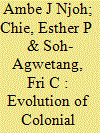

|
|
|
|
|
| Summary/Abstract |
The study examines Germano-Anglo colonial towns in Cameroon to determine factors accounting for the scarcity of infrastructure as well as streets and places with Eurocentric names. Using primary and secondary data, it demonstrates that the lack of infrastructure in the polity is a function of negligence by colonial and post-colonial authorities. With few pieces of public infrastructure, the authorities have had few streets and places to attribute names from Eurocentric lexical dictionaries. These findings contribute to knowledge of the relative impact of endogenous and exogenous factors on toponymic traditions as well as inter-country differentials in African countries’ development profiles.
|
|
|
|
|
|
|
|
|
|
|
|
|
|
|
|
| 15 |
ID:
172886
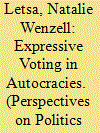

|
|
|
|
|
| Summary/Abstract |
Why do people vote in autocratic elections? Until now, most answers to this question have argued that people vote because they expect a material reward, such as patronage or a direct transfer via vote-buying, or as a way of rewarding the regime for its economic performance. I argue that citizens also vote for different non-economic, expressive reasons, such as a sense of civic duty or a desire to improve the democratic process. I present data from an original quasi-national public-opinion survey conducted in Cameroon, which shows that expressive reasons for voting can explain more variation in voting behavior than economic reasons. These different motivations challenge the implications of existing models of democratization by explaining how some of the poorest electoral autocracies have withstood decades of economic stagnation.
|
|
|
|
|
|
|
|
|
|
|
|
|
|
|
|
| 16 |
ID:
142394
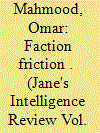

|
|
|
| 17 |
ID:
085069
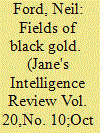

|
|
|
| 18 |
ID:
097698
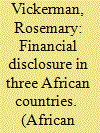

|
|
|
|
|
| Publication |
2009.
|
| Summary/Abstract |
Many countries use financial disclosure to manage conflicts of interest. This article
examines disclosure in three African countries: Cameroon, Ghana and South Africa.
These countries fall on a continuum that sees South Africa as the relative success
story, Ghana as occupying the middle position, and Cameroon as failing thus far.
Disclosure regulations detailing who discloses, how often this occurs and what and
when sanctions are to be taken for breaching regulations are presented in brief. Three
key recommendations are made in relation to the legislation and the implementation
thereof. First, it is suggested that in South Africa and Ghana the process of instituting
sanctions be streamlined and, second, that those tasked with keeping the registers of
financial interests are provided with the necessary investigatory powers. Finally, it is
recommended that Ghana and Cameroon practise annual disclosure.
|
|
|
|
|
|
|
|
|
|
|
|
|
|
|
|
| 19 |
ID:
107190
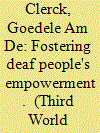

|
|
|
|
|
| Publication |
2011.
|
| Summary/Abstract |
From its beginnings deaf studies has acknowledged that deaf people have their own ways of learning, knowing and viewing the world. A recently emergent culturally sensitive line aims to document indigenous sign languages and deaf cultural patterns in non-Western contexts. Employing the concept of deaf (indigenous) epistemologies as an analytical tool enhances insight into the diverse lives and experiences of deaf people both as individuals and as members of a community. This concept is explored through its application to a case study of emancipation processes in the deaf community in Cameroon. The challenges of an ongoing research process, a participatory and community-based approach, and the valuing of deaf indigenous knowledge in research are presented. These challenges also included negotiation of research findings and exposure of the Cameroonian deaf community to deaf indigenous knowledge on a broader scale in a way that fostered the community's empowerment and ownership of the present study.
|
|
|
|
|
|
|
|
|
|
|
|
|
|
|
|
| 20 |
ID:
130385
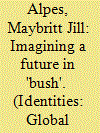

|
|
|
|
|
| Publication |
2014.
|
| Summary/Abstract |
This article addresses the migration aspirations of young, lower middle-class Cameroonians living in Anglophone Cameroon. Deportations and prevention campaigns portray the negatives of migration, yet often have little impact because they assume that migrants' aspirations are grounded in the prior success of other migrants. This research takes its lead from the question: Why aren't aspiring migrants in Cameroon discouraged by migration failure? It is based on an ethnographic fieldwork conducted between September 2007 and January 2009 in Buea (South West Cameroon). Since the late 1990s, the desire for a future 'away from home' has come to be expressed in Anglophone Cameroon by aspirations of going to 'bush'. Taking seriously people's conceptions of success and failure in places of departure, the article argues that locally voiced claims of 'global belonging' exert an important influence on migration aspirations. An understanding of deeply rooted migration desires must include an analysis of identity politics.
|
|
|
|
|
|
|
|
|
|
|
|
|
|
|
|
|
|
|
|
|